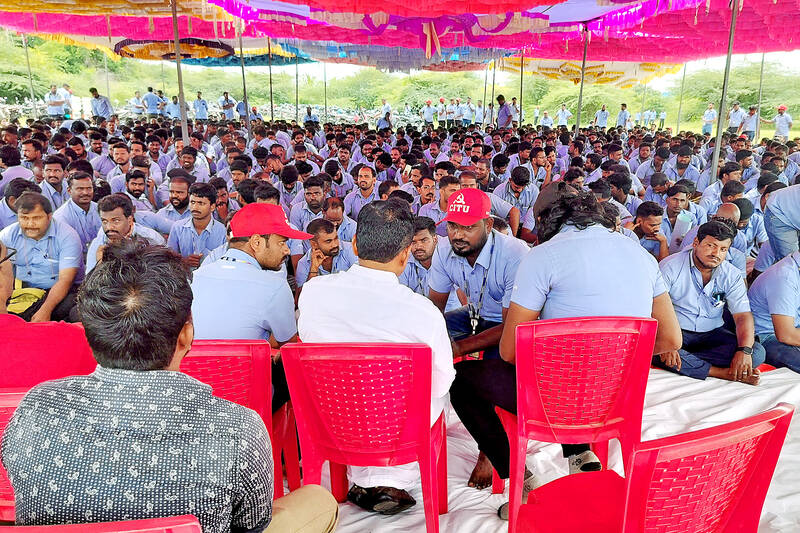Police have detained 104 striking workers protesting low wages at a Samsung Electronics Co plant in southern India, as they were planning a march yesterday without permission, officials said.
The detention marks an escalation of a strike by workers at a Samsung home appliance plant near Chennai in the state of Tamil Nadu. Workers want higher wages and have boycotted work for a week, disrupting production that contributes about one-third of Samsung’s annual India revenue of US$12 billion.
The Samsung protests have cast a shadow on Indian Prime Minister Narendra Modi’s plan of courting foreign investors to “Make in India” and tripling electronics production to US$500 billion in six years as foreign companies diversify their supply chain beyond China.

Photo: Reuters
The workers yesterday planned to start a protest march, but were detained as no permission was given since there are schools, colleges and hospitals in that area, Kanchipuram District senior police officer K. Shanmugam said.
“It is the main area which would become totally paralyzed and [the protest would] disturb public peace,” he said. “We have detained them in wedding halls as all of them can’t be in stations.”
Workers have since last week been protesting at a makeshift tent near the plant, demanding higher wages, recognition for a union backed by the influential labor group Centre of Indian Trade Unions (CITU) and better working hours.
Samsung is not keen to recognize any union backed by a national labor group, such as the CITU, and talks with workers and state government officials have not yielded any resolution.
The South Korean company is planning job cuts of up to 30 percent of its overseas staff in some divisions, including in India.
India’s antitrust body has found that Samsung and other smartphone companies colluded with e-commerce giants to launch devices exclusively, contravening competition laws, Reuters has reported.
The Samsung plant employs about 1,800 workers and more than 1,000 of them have been on strike.
The factory makes appliances such as refrigerators, TVs and washing machines.
Another Samsung plant that makes smartphones in the northern state of Uttar Pradesh has had no unrest.
CITU leader A. Jenitan said police also detained one of their senior leaders, E. Muthukumar, who was leading the Samsung protests at the factory near Chennai.
“The workers have been asked to return to the [strike] tent,” he said.
Shanmugam said there was no timeline as to how long the workers would be detained.

SEMICONDUCTORS: The German laser and plasma generator company will expand its local services as its specialized offerings support Taiwan’s semiconductor industries Trumpf SE + Co KG, a global leader in supplying laser technology and plasma generators used in chip production, is expanding its investments in Taiwan in an effort to deeply integrate into the global semiconductor supply chain in the pursuit of growth. The company, headquartered in Ditzingen, Germany, has invested significantly in a newly inaugurated regional technical center for plasma generators in Taoyuan, its latest expansion in Taiwan after being engaged in various industries for more than 25 years. The center, the first of its kind Trumpf built outside Germany, aims to serve customers from Taiwan, Japan, Southeast Asia and South Korea,

POWERING UP: PSUs for AI servers made up about 50% of Delta’s total server PSU revenue during the first three quarters of last year, the company said Power supply and electronic components maker Delta Electronics Inc (台達電) reported record-high revenue of NT$161.61 billion (US$5.11 billion) for last quarter and said it remains positive about this quarter. Last quarter’s figure was up 7.6 percent from the previous quarter and 41.51 percent higher than a year earlier, and largely in line with Yuanta Securities Investment Consulting Co’s (元大投顧) forecast of NT$160 billion. Delta’s annual revenue last year rose 31.76 percent year-on-year to NT$554.89 billion, also a record high for the company. Its strong performance reflected continued demand for high-performance power solutions and advanced liquid-cooling products used in artificial intelligence (AI) data centers,

Gasoline and diesel prices at domestic fuel stations are to fall NT$0.2 per liter this week, down for a second consecutive week, CPC Corp, Taiwan (台灣中油) and Formosa Petrochemical Corp (台塑石化) announced yesterday. Effective today, gasoline prices at CPC and Formosa stations are to drop to NT$26.4, NT$27.9 and NT$29.9 per liter for 92, 95 and 98-octane unleaded gasoline respectively, the companies said in separate statements. The price of premium diesel is to fall to NT$24.8 per liter at CPC stations and NT$24.6 at Formosa pumps, they said. The price adjustments came even as international crude oil prices rose last week, as traders

SIZE MATTERS: TSMC started phasing out 8-inch wafer production last year, while Samsung is more aggressively retiring 8-inch capacity, TrendForce said Chipmakers are expected to raise prices of 8-inch wafers by up to 20 percent this year on concern over supply constraints as major contract chipmakers Taiwan Semiconductor Manufacturing Co (TSMC, 台積電) and Samsung Electronics Co gradually retire less advanced wafer capacity, TrendForce Corp (集邦科技) said yesterday. It is the first significant across-the-board price hike since a global semiconductor correction in 2023, the Taipei-based market researcher said in a report. Global 8-inch wafer capacity slid 0.3 percent year-on-year last year, although 8-inch wafer prices still hovered at relatively stable levels throughout the year, TrendForce said. The downward trend is expected to continue this year,